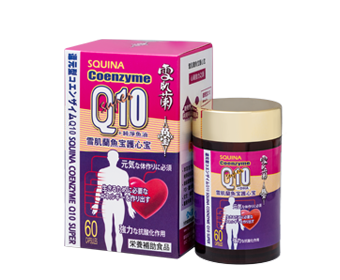Main Ingredients:
Coenzyme Q10 (Ubiquinol) + Omega-3 DHA
Coenzyme Q10: The Power Source for the Heart
Coenzyme Q10 (CoQ10) is an essential substance that the human body cannot do without. Over 90% of the body’s energy relies on CoQ10.
Mitochondria (the energy factories of cells) not only deeply participate in metabolic regulation and strengthen immunity but also synthesize ATP (adenosine triphosphate) from organic compounds such as fats, proteins, nucleic acids, and nucleotides. This fuels cells and generates energy. CoQ10 acts like the fuel for mitochondria, providing the necessary energy to power these cellular engines. When the body has sufficient CoQ10, it signifies a strong heart, brain, and other vital organs. Conversely, a deficiency in CoQ10 leads to mitochondrial dysfunction, disrupting normal cellular energy production and directly causing damage to the heart, brain, and other critical organs, potentially triggering serious diseases. Naturally, organs with higher energy demands, such as the heart and brain, contain more mitochondria and higher levels of CoQ10. Therefore, CoQ10 is absolutely crucial for maintaining the health of the heart and brain.
CoQ10 Declines with Age
The body can produce CoQ10 on its own, especially during youth. However, as we age, factors such as genetics, lack of exercise, stress, poor diet, medications, and environmental influences can lead to insufficient or depleted CoQ10 levels. This impairs mitochondrial function, affecting organ cells and increasing health risks. Thus, supplementing with high-quality CoQ10 is vital for preserving the integrity of mitochondrial function in the heart, brain, and other major organs.
Why Reduced CoQ10 (Ubiquinol) is Superior?
Coenzyme Q10 is divided into the reduced form (QH2) and the oxidized form (UQ). The main differences lie in the number of electrons they possess, their biological activity and functions, absorption and stability, as well as clinical applications. The reduced form of CoQ10 has two additional electrons compared to the oxidized form, which not only gives it better stability, absorption rate, and biological activity but, most importantly, enables it to act as a potent antioxidant and enhances the effectiveness of vitamins C and E. As for the oxidized form of CoQ10, its molecular structure is less stable, and its absorption rate and activity are also lower. Therefore, understanding the differences between the two can help us make more informed choices and use CoQ10 supplements more effectively.



